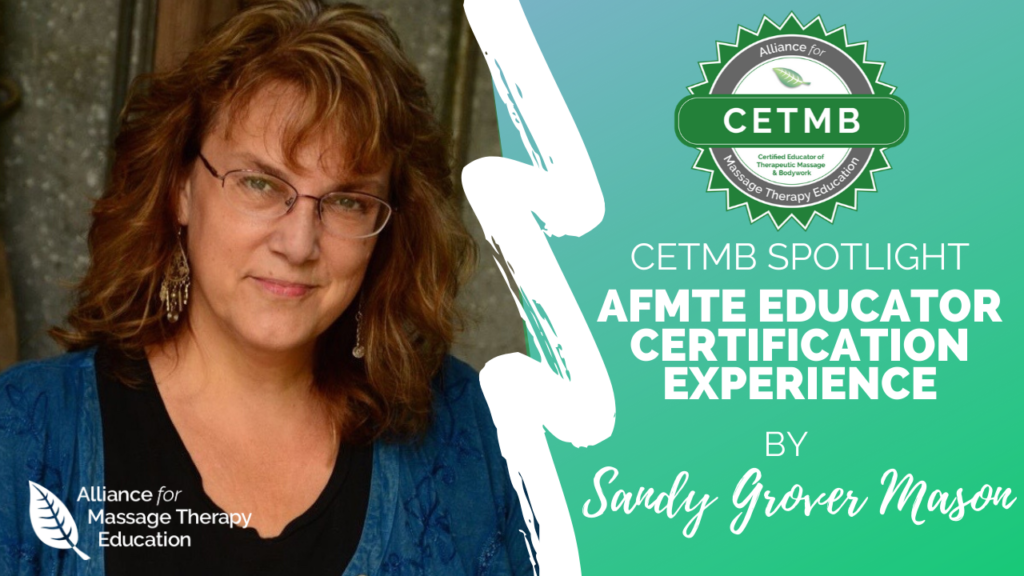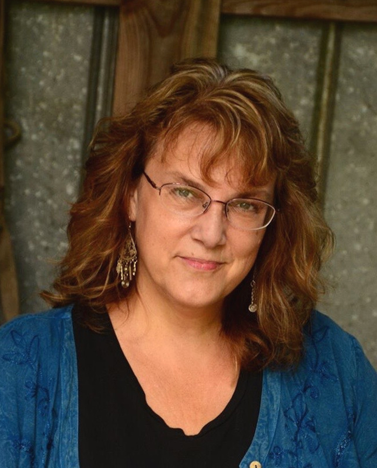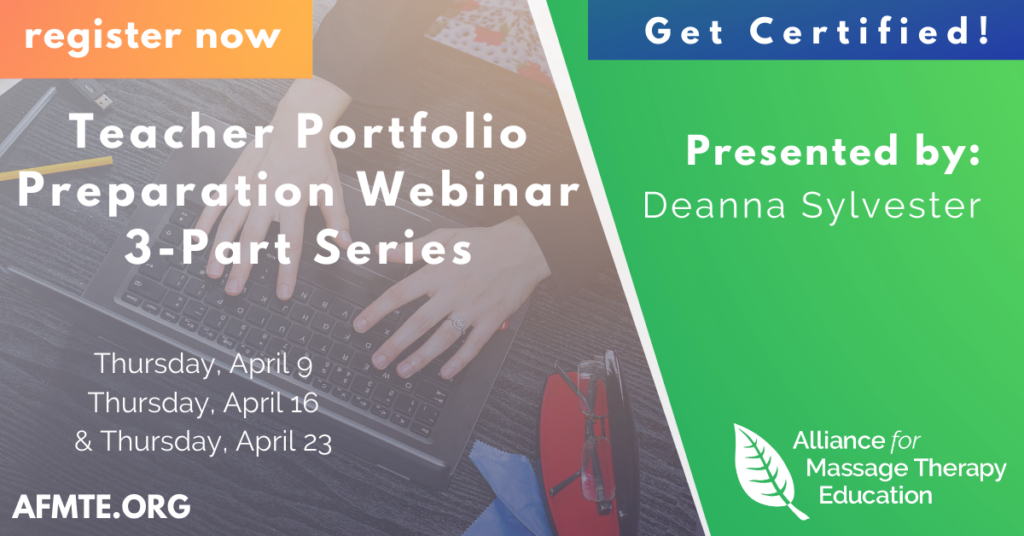
Educator Certification Experience by Sandy Grover Mason
Thinking about my history in massage therapy education immediately brings to mind two teachers who worked at a school with me, and how vastly different they were. In short, one was probably the best teacher I have seen before or since, and the other was quite possibly the worst. Having little access to feedback and essentially no credentials in education, I asked myself how I could be more like the great teacher, and less like the poor one. And unfortunately, other than intuition, I did not have an answer, because my school (like practically every other massage school in the country) had no requirements for teachers – not even being a licensed or certified Massage Therapist.
I relied upon student evaluations, peer discussions, and the few teacher training courses I could find that would also offer CE credits, as well as feedback and impetus for upgrading my class material or teaching style.
My father was a University professor emeritus at VA Tech and freely offered advice about teaching, but it did not always seem to apply to the unique world of bodywork education (suffice it to say, he had no experience with students regularly disrobing in his classroom). Other than pursuing a degree in Education (which has appealed to me for years but requires both financial and time commitments still beyond the scope of what I can offer), what resources do I have to ensure my success as an educator?
My passion for teaching massage therapy led me to two more schools due to one closing and then after relocating to North Carolina; yet, I seemed to consistently have the ability to transfer information to students in a memorable way. There are not terribly many massage therapists in this country, and the number of those who attempted to be educators felt woefully small, so my thoughts often turned to these questions: Where was my peer group? Who could reassure me that I was a good teacher?
That is why, as soon as I heard that The Alliance was being formed in 2009, I knew I had to be a founding member. At last, I had found my people!
I dove head-first into committees– TESP, NTTCDC, CPC – all with the aim of solving that problem my school had (and actually nearly every other school where I had taught) all those years ago: a widely disparate and untrained faculty. Boy, was I in for an education! Not only were all the committee members well-versed in education, they were also seasoned teachers with often decades of experience and multiple degrees in the field. I was immersed in terminology I found mystifying and intriguing, and sat in wonder as my colleagues quibbled over concepts like Bloom’s Taxonomy, MTBOK, ELAP or Standards of Practice. I was woefully uneducated about all of these things but was ready to learn, and I happily sat at the feet of many masters as we set about preparing the Core Competencies.
We were united by our goals. The aim to educate massage therapy educators seemed like the best way to elevate the entire profession—start at the bottom and make sure every student is being taught at the very beginning by someone who knows what they’re doing! It was the summer of 2018 when I finally got my dream: the chance to take part in the process of becoming a Certified Educator!
Like all good endeavors, this, too, was an educational experience. The process I went through was a portfolio submission, designed for those who are already educators of massage therapy. In following the directions and reviewing the Core Competencies, I found I had ample evidence of my ability to plan lessons, create assessments, and complete a full resume.
The video section was probably the most challenging in that I had to find someone who was willing to document me while I was teaching relevant material, and the coordination of my classes with a willing videographer proved to be quite daunting.
The most valuable lesson I learned with the portfolio process involved the submission of both formative and summative assessments. While I use both in my regular classroom content, I had not fully been using either one as a CE provider. It caused me to review the format of my CE classes, and while I was providing formative assessments via verbal feedback and hands-on corrections, I had not given my students the summative assessment other than a certificate of completion. After this process I have developed a rubric with which to “grade” each of my CE students as a form of feedback for them.
I was thrilled to receive my CETMB once my portfolio had been reviewed, and was quick to share the information with my Program Coordinator, Director, and Dean at Forsyth Technical Community College where I work and teach.
Forsyth Tech has always emphasized professional development, and offers many opportunities for teachers to increase their knowledge or familiarity with teaching methods, classroom technologies, online class strategies, and generally all things educational. But they and other community colleges are also keenly interested in advanced credentials for their faculty. Any educator who pursues a higher degree (or certification or license) is rewarded with public acclaim and an ensuing pay increase. Community colleges often boast of the percentage of their faculty who have achieved anything from an increase in faculty ranking to the achievement of earning a Masters or PhD.
I feel the Teacher Certification is especially relevant in the community college system for these reasons. My own Program Coordinator has proposed that we find a way to get all of our faculty to earn their CETMB so we can boast that we have the first Therapeutic Massage program taught by all Certified Educators. Through the NCCCC (North Carolina Consortium of Community Colleges) we have the opportunity to unify teacher standards within all of our programs, meaning a greater continuity among the community colleges throughout the state. If every massage Program Coordinator, Clinical Coordinator, or adjunct instructor in the community college system could boast a CETMB, I believe that transferal of credit from one college to another, or advancement from entry level into the Associate Degree programs could be smoother and more easily negotiated than it is at the current time.

Sandy Mason is a founding member of AFMTE and is currently Clinical Education Coordinator and full-time Instructor at Forsyth Technical Community College in North Carolina in both the entry-level and Associate Degree Therapeutic Massage Programs. She is a NCBTMB Approved Provider and has presented classes at local and national AMTA conventions. Her passion for elevating educational standards for our profession is evident in her active roles in the Alliance’s NTESP project through the National Teacher Training Curriculum Development Committee (NTTCDC) and the Certification Process Committee (CPC). She has been a textbook reviewer, contributing author and subject matter expert for exam development in the profession, and runs a private practice in Winston-Salem.
Register for our free webinar to get prepared to apply for AFMTE Educator Certification! Teacher Portfolio Together

